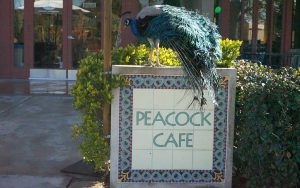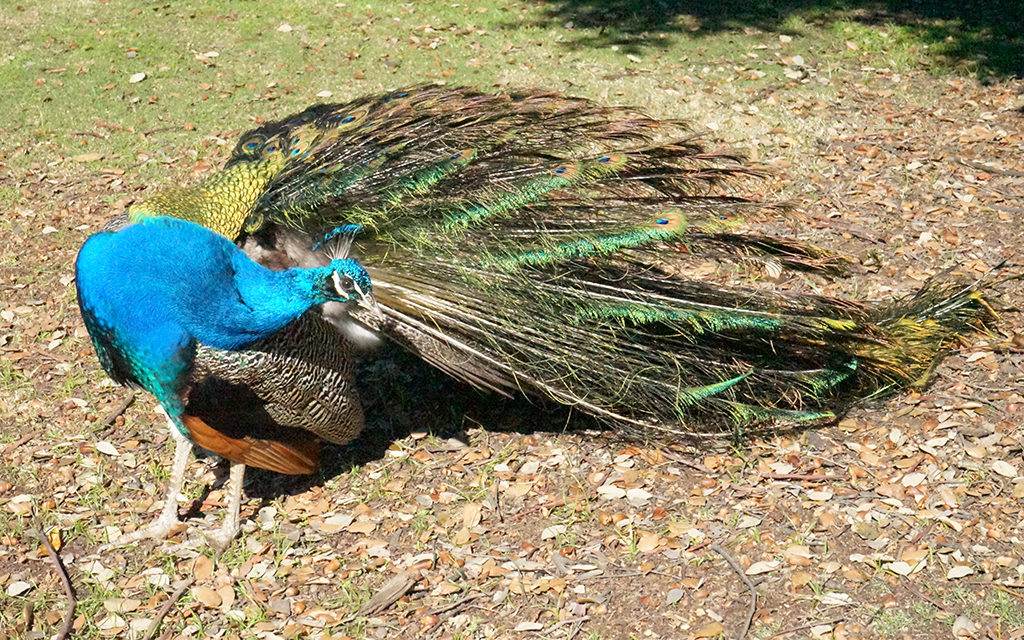ARCADIA, Calif. – To some, it’s the sound of nature. To others, it’s a never-ending screeching nightmare.
Several Southern California communities are leading a peacock rebellion, taking action after complaints of noise and waste.
There have been decades of debate between residents who want the beautiful birds to stay versus the ones who want nothing to do with them. The latest battle took place in the placid, affluent city of South Pasadena, California, where the city council late last year voted to rid itself of the problem by trapping and relocating birds to private ranches, the Los Angeles Times reported.
One resident, Ron Reyes, told the Times, “There is just poop all over this ramp,” and “This is infuriating, not to mention peacocks have destroyed my garden.”
But on the other hand, there are advocates like Dennis Fett, a consultant in Iowa and a co-founder of the Peacock Information Center who has been helping California communities with their peafowl problem since the late ’90s.
“I get lots of calls. I’ve had people who call me and say, ‘We got a problem, can you help me?’ My problem is we don’t have any benefactors or funding to go fly out and help,” said Fett.
Fett said Rolling Hills Estates, a Los Angeles suburb, hired him in 1992 to educate the community and provide a peafowl management plan. But the city didn’t retain him.

A live peacock happens to hop atop a sign for an eatery at the Los Angeles County Arboretum and Botanic Garden in Arcadia, California, in this photo taken Jan. 31, 2023. Peacocks have a happy home at the garden, but some communities have rebelled at having them wandering through neighborhoods. (Photo by Ayana Hamilton/Cronkite News)
“They were very complimentary,” Fett said, but he later added that he could tell them, “what they’re doing right, and what they’re doing wrong with the wild peafowl. But they never followed through with that.”
Fett says the plan would’ve been a success if the city stayed in touch with him every year. But instead, he feels like he’s alone in wanting to save peacocks in Southern California.
However, he’s not. Residents banded together to create Friends of the Peacock in 2003 to keep the birds in Rancho Palos Verdes, a city adjacent to Rolling Hills Estates.
“The peacocks have been here for almost a hundred years. So they were here before most of the people that are here,” said the group’s president, Debbie Mott. “There’s a historic element to preserving them.”
She said her group was instrumental in crafting a plan to manage peacocks in the city. The program doesn’t allow trapping during or after mating season.
“We do have a program for managing the size of the flock, which keeps everybody in our city pretty much happy,” said Mott.
While their presence is controversial in neighborhoods, they are welcome in certain locations.
There are over 200 peacocks at the Los Angeles County Arboretum and Botanic Garden in Arcadia. It’s a safe haven for peacocks, a public garden where they are appreciated and loved.
On one recent day, individual birds nonchalantly wandered the walkways, pecked at the grass, occasionally screeched and one displayed plumage. A small boy pointed out the birds and one wandered up to a reporter.
Peacocks are part of local history. The arboretum is situated on the site of an estate that long had them.
“In the late 1800s, several breeding pairs of peacocks were brought over from India by a gentleman named Lucky Baldwin,” said Frank McDonough, a botanical information consultant at the arboretum. “They established very well here.”
He said the birds thrive around people. Besides being beautiful, they’re free pest control.
“If you go to a neighborhood with peacocks, you will not find any snails or slugs. It’s amazing,” McDonough said. Plus, “your insect infestations go way down ‘cause that’s what they’re eating.”
And in a metropolis where homeowners care a lot about property values, having a few peacocks ambling around “can increase the amount of money you get for your house if you sell it and increase the property rates in general.”
If you get rid of them?
“Removing peacocks is basically removing money,” he added.


